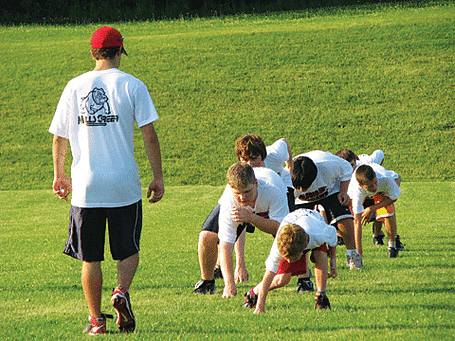Overnight Summer Camp vs. Sports Camp
What summer camp should I go to?

There are many kinds of camps that compete with resident camp for our kids' attention during the summer. As parents, it's important to understand what our kids are gaining and learning from different kinds of summer experiences.
One popular option is the specialty sports camp. We see more and more kids enroling at sports camp focused on specialized movement and athletic skils development at an early age. Most families recognize the benefits of both experiences. The best case scenario is for children to get both experiences, however, that is not always possible. This post discusses the benefits and differences between sports camp and overnight camp.
What does your child learn?
At a sports camp, your child will learn and practice very specific skills related to his or her sport. That could be the correct technique for a backhand return in tennis, the right form for fielding a ball in baseball, or the best approach for a spike in volleyball.
Those things are fun to learn, but that's about where the growth stops at most sports camps.
At overnight camp, kids are exposed to many more learning opportunities:
- Living in a cabin with 10-11 peers
- Trying new activities on a daily basis
- Exposure to activities at which they excel
- Exposure to activities at which they are not the best in their cabin
- Exposure to college-aged role models trained to encourage their growth
Overnight campers become members in a community committed to help them grow in more broadly applicable skills. The opportunities above stimulate growth in areas like social ability, independence, courage, curiosity, sportsmanship, persistence, and friendship. These are the character skills that help kids grow into high achieving adults who know how to find their way in the world.
One way we've learned to think about the benefits of overnight camp is with the phrase “College and Career Readiness”. In fact, it's practically the best college training we can think of.
What the experts say:
Eminent child psychologist Dr. Michael Thompson (author of Raising Cain and Homesick and Happy) agrees. In a recent Huffington Post article about the benefits of summer camp, he shares that:
When I interviewed college admissions officers about how they view campers, they say that they think former campers are more likely to succeed in college because they have had successful experiences away from home.
There's nothing wrong with a great sports camp, but it's hard to argue that kids are learning more or growing more than they do at a multiweek overnight camp. Overnight camps are uniquely positioned to build the broadly applicable skills that are required for succeeding in college and beyond.
Difference between overnight sports camp and resident summer camp
An overnight sports camp will confer more advantages than a day camp, but will still lack opportunities that a great traditional resident camp will offer.
 I. Building Social IQ
I. Building Social IQ
The first difference is that most overnight sports camps are one week in length. One of the most valuable opportunities at a resident camp is practicing how to build real, substantive friendships. At a one week camp, the first few days are spent getting the hang of the routine and getting used to the new environment. Then the last day or two is spent wrapping up and getting all of those last activities in, so there really isn't enough time to build meaningful friendships. It takes two or three weeks of living together to adequately stretch that social muscle.
II. Getting out of the comfort zone and into the stretch zone
One other difference is that your child is unlikely to be pushed outside of his comfort zone if he gets to focus on his favorite sport all day. We grow when we are pushed. At a traditional overnight camp, he will be exposed to dozens of different activities each week. He will still get to play his favorite sports, but will also try things like rock climbing, skiiing, and music that will stretch his abilities in other ways. It's healthy for kids to do things that they are good at, but also to do activities at which they are not quite so naturally proficient.
III. Skill Development
Finally, we have to remember “Coach's little secret”. Every year, we take at least one call from a long time camper whose sports coach is insisting that he or she attend summer practices that conflict with camp, at the risk of not making the starting lineup next year. The coach will always play the best players, and three weeks at camp might come as a needed break from endless, year-round practice.
In fact, participating in multiple sports and activities at a young age will young athletes develop a wider range of movement pattern capabilitites. Research shows that pre-high school aged children achieve greater benefits to overall motorskill development from athletic generalization than sport specific specializiation. If Drew Brees could find a way to take three weeks off from football each summer to come to Camp Champions, most other athletes probably can too.
The Bottom Line
If your kids are interested in a specialty sports camp, go ahead and send them! They will enjoy it and find out whether that's a sport they want to stick with. Just make sure that overnight camp doesn't get crowded out of the schedule, because it's overnight camp that's teaching your kids the most important skills that they will gain over the summer.
We have compiled resources for you to find the right summer camp for your families needs. Learn more by clicking the link below.


